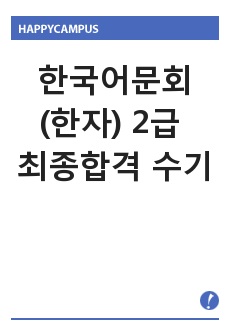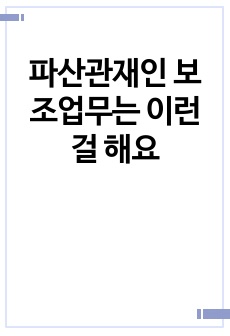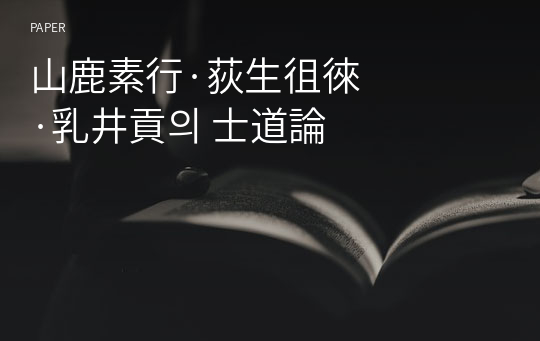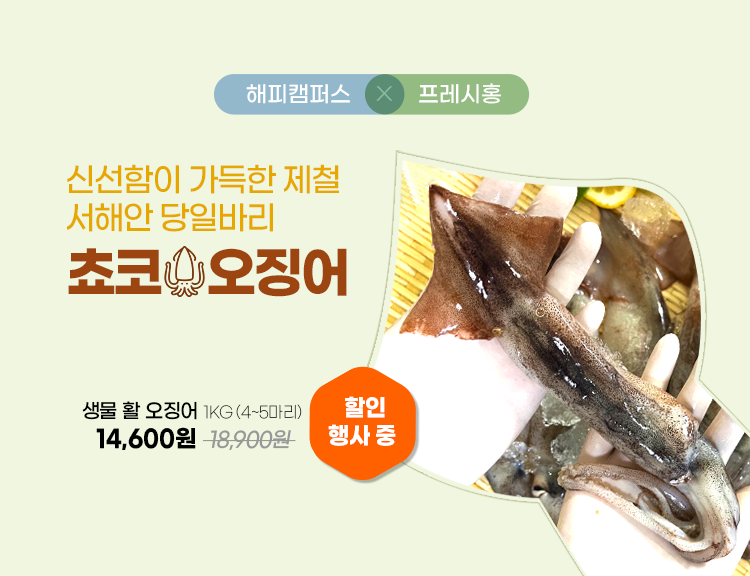* 본 문서는 배포용으로 복사 및 편집이 불가합니다.
서지정보
ㆍ발행기관 : 영남퇴계학연구원
ㆍ수록지정보 : 퇴계학논집 / 9권
ㆍ저자명 : 고지마 야스노리
ㆍ저자명 : 고지마 야스노리
목차
1. 서론2. 儒敎와 德川武家社會
3. 山鹿素行
4. 荻生徂徠
5. 乳井貢
6. 결론을 대신하여 -‘公’을 담당하는 ‘私’
한국어 초록
선비란 조선왕조시대에 과거에 합격하여 관료가 되어서는 왕을 섬기며 백성을 위한 정치에 매진하고, 물러나서는 재야에서 학문을 가르쳐
후진을 길러 사회에 유교 이념을 구현하고자 했던 계층을 가리킨다. 선
비는 국왕에게 충성을 다하는데, 그 이상으로 보편적인 ‘理’를 중시하여
왕에게 잘못이 있으면 간언할 것을 책무로 삼고, 간언이 받아들여지지
않으면 주저 없이 관직을 그만두었다. 왕과 선비와의 관계는 ‘義理’로
연결되어 선비는 왕에게 오로지 종속되는 자는 아니었다. 이 점은 일본
의 사무라이(侍) 사회에서 양성되어 온 主從關係와는 사뭇 다르다. 예를
들어, 하가쿠레(葉隠)로 유명한 야마모토 조초(山本常朝)는 主君의 잘
못을 간하여 받아들여지지 않더라도 주군을 떠나지 않고 잘못을 포함해
주군에게 더욱 봉공하라고 설파할 것이다. 에도(江戸) 시대에는 주군과
의 운명공동체적인 주종 관계 속에서 살아가는 하가쿠레적인 무사도
있었지만, 한편으로는 도쿠가와(德川) 시대의 ‘평온한 세상(静謐の世)’에
서 무사의 존재 이유를 유교 이념으로 의미를 부여하고자 했던 이들도
있었다. 사무라이로서 살 것인가, 君子로서 살 것인가, 또는 양자를 통
합한 삶의 방식을 취할 것인가, 이렇게 에도 시대 무사들의 아이덴티티
(Identity)는 흔들리고 있었다.
본고에서는 유자와 무사 사이의 儒者와 武士 사이의 이중의 아이덴티
티로 살았을 도쿠가와 시대 일본의 세 무사(山鹿素行、荻生徂徠、乳井
貢)를 고찰의 대상으로 하였다. 도쿠가와 시대의 일본사회와 조선사회
는 정치체제도 사회구조도 자연히 다른 것으로, 선비와 무사를 단순히
비교하는 것은 불가능하다. 하지만 선비와 무사는 모두 통치자 계급으
로서 노블레스 오블리주(Noblesse Oblige)를 스스로에게 부과하여 사
회를 주도하고자 했던 점에서는 공통된 면이 있다. 그러한 의미에서 일
본 무사의 노블레스 오블리주의 한 모습이 선비정신의 연구에 참고가
되었으면 한다.
뉴이 미쓰기(乳井貢)는 히로사키 번(弘前藩)의 간죠부교(勘定奉行)로
서 당시의 재정개혁을 단행했던 실무가임과 동시에, 야마가 소코와 오
규 소라이에게 사숙한 유자이기도 하였다. 도쿠가와의 태평 시대에 소
코와 소라이는 무사의 이념을 어떻게 재정립하였는지, 그리고 이 두
사람의 사상에 깊이 경도되어 실제로 藩政改革을 단행했던 뉴이 미쓰기
를 살펴보면서 무사가 ‘公’을 담당해가는 윤리적 주체로서의 그의 ‘私’
의식의 각성을 고찰하였다.
영어 초록
Sonbi refers to a social class of people, particularly of the Chôsondynasty, who, if they passed the civil service examinations and became
bureaucrats, served the king and worked in politics for the people, and
once they retired would teach at an academy and train the next
generations, making efforts to realize Confucian principles in society.
While Sonbi served the king with loyalty, they also upheld a universal
“principle,” such that if the king committed wrong, they remonstrated,
and if their remonstration was not heard, they resigned from their post
without hesitation. The relationship between king and Sonbi was bound
by “duty” (giri), and Sonbi were not completely subordinate to the king.
In this respect, their relationship differs from the lord-vassal relationship
developed in samurai society of Japan. For example, if a vassal
remonstrated to his lord over wrongdoing and was not heard, the
famous Yamamoto Tsunetomo, author of Hagakure, would probably
urge him to serve his lord, including all his faults, all the more. In the
Edo period, there were bushi (warriors) like those depicted in Hagakure,
who lived paying homage to their lord and shared in their lord’s fate.
On the other hand, during this “peaceful age,” there were others who
attempted to define the reason for the samurai’s existence through
Confucian thought. Whether they lived as samurai, as gentlemen, or as
a combination of both, the identity of Edo period bushi was in flux.
In this paper, I took up three bushi (Yamaga Sokô, Ogyû Sorai, and
Nyûi Mitsugi) of Tokugawa Japan, who lived a dual identity of both
Confucianist and bushi. The societies of Tokugawa Japan and Yi
Dynasty Choson differ in political system and structure, and so sonbi
and bushi cannot be compared hastily. However, there is a common
element in both groups as ruling classes who strived to live up to the
spirit of noblesse oblige and to lead society. In that sense, examining one
portion of noblesse oblige among Japanese bushi, can offer hints that shed
light on the spirit of sonbi.
Nyûi Mitsugi, a magistrate of the exchequer in Hirosaki domain,
carried out administrative and financial reform within the domain as a
practician. At the same time, Nyûi was also a Confucian who learned
from Yamaga Sokô and Ogyû Sorai. I considered how Sokô and Sorai
recast the concept of the bushi in a peaceful society of the Tokugawa
period, and examined the case of Nyûi, who was deeply committed to
their thought and carried out actual reform in domainal politics. I also
paid attention to the awakening of Nyûi’s “private” consciousness as
ethical subject, of a bushi that upheld the “public.”




























